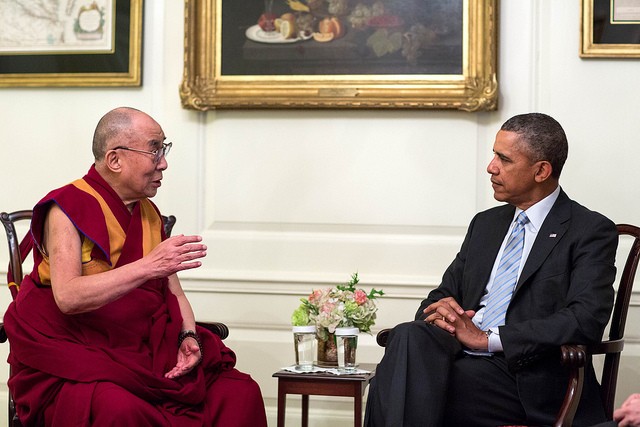
While it is easy to take the meeting between Barack Obama and the Tibetan spiritual leader Dalai Lama at its face value and see it as just another meeting, China seems to have legitimate reasons to be suspicious that some anti-China propaganda could have been going on between the two men.
Obama has reiterated, after the meeting, that the US recognizes Tibet as part of China and does not support "Tibet independence", the White House said. While that could be a diplomatic way to put it, it doesn't give China a reason, not to look at the situation with raised eyebrows.
Dalai Lama is looked at from different angles by US and China, and this difference is a well known fact. China views the spiritual leader, who fled to India after a failed uprising in 1959, as a "wolf in sheep's clothing" and someone who actually resorts to violent means in his ambition to establish an independent Tibet. On the other hand US' stance that it is 'concerned' with human rights issues in China has long been taken as a signal that Uncle Sam leans towards the cause of Dailai Lama, much to the chagrin of Beijing.
The Tibetan leader, a Nobel Peace Prize laureate, says he is merely pushing for his "middle way" approach in seeking greater 'autonomy'. He has insisted that he is not demanding independence or inciting violence.
But the question that is bothering China at the hour is why would Obama still hold the meeting with the Dalai Lama even after warning that it would "severely damage relations"? Is it enough to say that the President met the Tibetan leader at his capacity "as an internationally respected religious and cultural leader"? What did they really talk about during the hour-long discussion in the White house? They wouldn't openly declare even if they held an anti-China discourse in White house, would they? But would it be surprising if we discovered that their talk was directed towards that end?
"Obama's meeting with the Dalai Lama is not just what the White House calls 'honoring the spiritual leader' or what we hear. Obama said that he is glad to meet the Dalai Lama," Tendar Tsering, a Tibetan freelance journalist based in Minnesota told International Business Times.
"Their meeting took more than an hour, so surely they have discussed a lot. But as much of the content is censored and limited to the media, we can't be certain what they actually talked about," he added.
But even as Beijing simmers in angry tantrums with "strong indignation and firm opposition" every time a seemingly anti-china discourse takes place in Washington, Tibetans always call the United States to have stronger dialogue for the Tibetan cause.
"Although there wasn't much significance, the meeting was symbolic and in politics, symbol matters," said Tsewang Chokden, a Tibetan American who works in a bank in Minnesota.
"As Tibetan Americans, we want Obama to be more assertive and upfront in Tibet matters as much as Bush was, if not more. But he has not much to offer in any significance in our real cause," he added.













!['It's not Mumbai traffic, it's air traffic': Suriya apologises to Mumbai media after paparazzi yelled At Him for making them wait for hours [Watch]](https://data1.ibtimes.co.in/en/full/806234/its-not-mumbai-traffic-its-air-traffic-suriya-apologises-mumbai-media-after-paparazzi.jpg?w=220&h=138)



